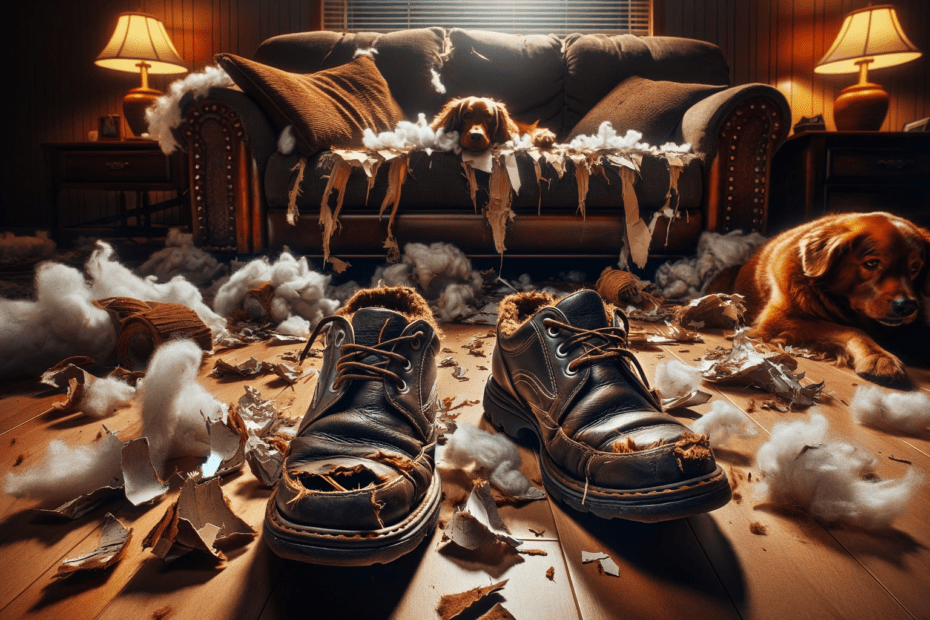Do you ever wonder why your dog engages in destructive chewing? It can be frustrating to come home to chewed-up furniture or shoes. But understanding the reasons behind this behavior is the key to finding a solution.
In this article, we will explore the common causes of destructive chewing in dogs, including boredom, anxiety, teething, and more. By gaining insight into your dog's behavior, you will be better equipped to redirect their chewing habits and create a harmonious home environment.
Key Takeaways
- Boredom or lack of mental stimulation can lead to destructive chewing in dogs.
- Anxiety and stress can trigger dogs to engage in destructive chewing behavior.
- Teething discomfort can contribute to chewing behavior in puppies.
- Providing appropriate chew toys, positive reinforcement, and close supervision can help redirect destructive chewing in dogs.
Common Reasons for Destructive Chewing
One common reason for destructive chewing in dogs is due to boredom or lack of mental stimulation. Dogs are highly intelligent creatures that require mental stimulation to prevent boredom and subsequent destructive behavior. When dogs are left alone for long periods of time without any interactive toys or activities, they may resort to chewing as a way to alleviate their boredom.
Another factor that can contribute to destructive chewing in dogs is separation anxiety. Dogs are social animals and when they're separated from their owners, they can become anxious and stressed. Chewing can serve as a coping mechanism for dogs with separation anxiety, providing them with a sense of comfort and distraction.
In some cases, medical conditions can also lead to excessive chewing in dogs. Dental issues, such as gum disease or tooth decay, can cause discomfort and pain, prompting dogs to chew on objects in an attempt to alleviate their discomfort. Additionally, certain medical conditions, such as gastrointestinal disorders or nutritional deficiencies, can lead to a heightened desire to chew.
It is important for dog owners to provide their pets with appropriate mental stimulation, interactive toys, and regular exercise to prevent boredom and destructive chewing. If a dog exhibits excessive chewing behavior, it's recommended to consult with a veterinarian to rule out any underlying medical conditions.
Impact of Boredom on Chewing Behavior
When your dog is bored, their chewing behavior can become destructive. Boredom often leads to excessive chewing, as dogs try to find ways to entertain themselves. Understanding the impact of boredom on chewing behavior can help you address this issue and prevent damage to your belongings.
One key factor in preventing destructive chewing due to boredom is providing cognitive stimulation. Dogs are intelligent creatures that require mental stimulation to prevent boredom. Engage your dog's mind by offering interactive toys, puzzles, or treat-dispensing toys. These toys can keep your dog entertained and mentally engaged, redirecting their chewing behavior to appropriate items.
Another crucial aspect of preventing destructive chewing is ensuring your dog gets enough exercise. Regular exercise not only helps to burn off excess energy but also provides mental stimulation. A tired dog is less likely to engage in destructive chewing behavior. Make sure to provide your dog with daily walks, play sessions, or other forms of physical activity that suit their breed and energy level.
Anxiety and Stress as Triggers for Chewing
If your dog is experiencing anxiety or stress, it can trigger destructive chewing behavior. Dogs often resort to chewing as a coping mechanism when they're feeling overwhelmed or unsettled. Understanding the underlying causes of anxiety and stress in dogs is crucial in order to effectively manage and reduce these triggers.
Anxiety in dogs can stem from various sources, such as separation anxiety, fear of loud noises or unfamiliar environments, or even previous traumatic experiences. Identifying the specific cause of your dog's anxiety is key to implementing appropriate anxiety management techniques. These may include behavior modification, desensitization and counterconditioning exercises, or the use of calming aids and supplements.
Stress in dogs can result from a range of factors, including changes in routine, lack of mental stimulation, or conflicts with other animals. Creating a safe and predictable environment for your dog can help alleviate stress. Providing regular exercise, engaging in interactive play, and offering mental enrichment activities can also contribute to stress reduction.
In addition to addressing the root causes of anxiety and stress, it's important to provide appropriate outlets for chewing behavior. Providing your dog with a variety of chew toys, such as puzzle toys or dental chews, can redirect their chewing instincts towards more appropriate items. Ensuring these toys are durable and safe for your dog's chewing habits is essential.
Teething and Chewing in Puppies
During this stage, puppies experience teething, which can contribute to their chewing behavior. Teething is a natural process in which a puppy's baby teeth are replaced by adult teeth. As the adult teeth push through the gums, puppies may experience discomfort and tenderness in their mouths. This discomfort can lead to an increase in chewing behavior as a way for puppies to relieve the pain.
To help alleviate teething discomfort in puppies, it's important to provide appropriate toys and chews. Look for toys that are specifically designed for teething puppies, as they're typically made of softer materials that are gentle on their developing teeth and gums. Avoid toys that are too hard or those that can be easily swallowed, as they can pose a choking hazard.
In addition to toys, there are also a variety of chews available that can help soothe a teething puppy's gums. Look for chews that are made of safe and digestible materials, such as rubber or nylon. Avoid chews that are too hard or have sharp edges, as they can cause damage to the puppy's teeth.
Tips for Redirecting Destructive Chewing
To redirect your dog's destructive chewing behavior, provide them with appropriate chew toys and regularly engage them in interactive play. Redirecting chewing behavior requires consistency and positive reinforcement techniques. Here are some tips to help you effectively redirect your dog's destructive chewing:
- Offer a variety of chew toys: Provide your dog with a selection of chew toys that are specifically designed for their size and chewing preferences. This will help satisfy their natural urge to chew and redirect their chewing behavior away from your belongings.
- Use positive reinforcement: When you catch your dog chewing on an appropriate chew toy, praise and reward them with treats or verbal affirmations. This will reinforce the desired behavior and encourage them to continue chewing on their toys.
- Supervise and redirect: Keep a close eye on your dog, especially during the early stages of training. If you notice them chewing on something they shouldn't, calmly redirect their attention to an appropriate chew toy. This will teach them what's acceptable to chew on and what's not.
Frequently Asked Questions
Can Dogs Engage in Destructive Chewing Due to Medical Issues?
Medical conditions and medications can contribute to dogs engaging in destructive chewing behavior. Understanding the underlying health issues and managing them appropriately can help address this problem.
Are Certain Dog Breeds More Prone to Destructive Chewing Behavior?
Certain dog breeds may be more prone to destructive chewing behavior due to genetic factors. Additionally, environmental factors can also contribute to this behavior in specific breeds. Understanding these influences can help address and prevent destructive chewing.
Can Dogs Outgrow Destructive Chewing Behavior?
You can help your dog outgrow destructive chewing behavior by using effective dog training techniques and providing appropriate chew toys. Consistency and patience are key in teaching them what is acceptable to chew on.
How Can I Prevent My Dog From Chewing on Furniture and Other Household Items?
To prevent your dog from chewing on furniture and other household items, try alternative chewing solutions like chew toys and bones. Additionally, training techniques such as positive reinforcement and redirection can help curb this behavior.
How Long Does It Take to Redirect a Dog's Destructive Chewing Behavior?
To redirect a dog's destructive chewing behavior, effective techniques include providing appropriate chew toys, crate training, and positive reinforcement. Common mistakes to avoid include punishment, lack of supervision, and not addressing the underlying cause.
Conclusion
In conclusion, dogs engage in destructive chewing for various reasons. These include boredom, anxiety, stress, and teething. This behavior is natural for puppies but can be frustrating for owners.
It's important to redirect their chewing towards appropriate toys and provide mental and physical stimulation to prevent boredom. Addressing any underlying anxiety or stress through training or professional help can also help alleviate destructive chewing behavior in dogs.
Understanding the reasons behind this behavior can assist owners in finding effective solutions.






